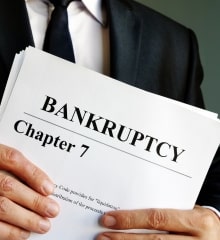Updated on 23 August 2025
What Happens With Unpaid Parking Tickets? The Complete Guide

People sometimes think that not paying a parking ticket is no big deal, but that’s not always the case. In fact, ignoring a parking ticket can have serious consequences ranging from fines to legal action or even having your vehicle impounded. If you ignore a parking ticket or two, you can easily find yourself being punished financially or legally.
How To Avoid Accumulating Unpaid Parking Tickets
The best way to avoid accumulating unpaid parking tickets is to avoid getting cited in the first place. It sounds easy, but you will need to be mindful to always be aware of local parking rules and regulations. You will need to be diligent in reading the signs posted in the areas you park and pay close attention to time limits, restrictions, and any other important information.
Even if you are careful, you may receive a ticket. If you do receive a ticket, pay it off as quickly as you can to avoid letting tickets accumulate. Additionally, if you pay off a parking ticket quickly, you can avoid paying additional penalties and interest. It’s better to own up to it and pay the fee than roll the dice.

Negative Consequences If You Don’t Pay Your Parking Tickets
You may be wondering what the worst-case scenario is for an unpaid parking ticket. For some people, in some places, it can mean a warrant for your arrest. However, it is important to understand that laws vary by state and location, so it’s important to understand your local laws.
In some locations, a judge can issue a bench warrant for your arrest if you don’t pay a ticket or appear at your scheduled court date. Even in locations that do not issue warrants, failing to pay your parking tickets can have a substantial impact on both your financial health and your ability to drive. Read the following sections of this guide to learn about the penalties you may face if you do not remit payment on time.
Fines
Parking tickets typically assess a baseline fine for the violation. However, if you don't pay on time, you can accumulate additional fines and interest. The issuing agency may also turn the debt over to a collection agency, which can result in additional costs. Be sure to familiarize yourself with the fine schedule or fee guide for any locality in which you regularly park.
Vehicle Confiscation
Some cities have a policy that allows booting or impounding vehicles with multiple unpaid parking tickets. If that happens, you typically need to pay all your past-due citations, plus any fines, penalties, and fees, including booting and/or towing fees, before you can get your vehicle back. If you cannot afford the payment, the city will likely impound your car and charge you storage fees every day.
Suspension of Your Driving License
If you have unpaid parking tickets, it’s possible that the municipality or issuing agency will report you to the state Department of Motor Vehicles, and your driving license will be suspended or unable to be renewed. If your driver's license is suspended, you will be unable to legally drive until the issue is resolved.
The number of unpaid parking tickets before your license is suspended depends on the laws where you live. For example, Illinois does not suspend licenses, so it is important to understand the rules where you live.
Do parking tickets expire?
Parking tickets don’t typically have an expiration date. However, there may be a statute of limitations that regulates how long a municipality can attempt to collect payment from you. While they may not be able to collect on the debt after the statute of limitations, the tickets often stay in the system indefinitely. You should not assume the tickets have expired or gone away, but you should be aware of your rights.
You should not just ignore a parking ticket. Unpaid parking tickets can lead to additional late fees and penalties, including collection actions, towing/booting, or even suspending your license. In some cases, unpaid parking tickets can even be reported to credit agencies, which can ultimately affect your credit score.
Many jurisdictions offer options if you are unable to pay, including payment plans or reduced fees if tickets are resolved early. Additionally, some cities hold amnesty programs periodically, which allow people to pay off older tickets penalty-free.
Do parking tickets affect your license?
Parking tickets don’t directly affect your driver’s license, since parking violations are considered non-moving violations, they don’t usually result in points on your license. However, unpaid parking tickets can escalate into more serious issues if left unresolved.
In Illinois, unpaid parking tickets can lead to the suspension of your vehicle registration or even your driver’s license. A suspended license or registration can prevent you from driving.
If You Owe a Fee For a Parking Violation, Can You Renew Your License?
If you owe parking fees, you may not be able to renew your license. It depends on where you live and the local and state laws; however, if you have ignored numerous parking tickets, you may be in for a rude awakening when you go to renew your driver's license.
How many unpaid parking tickets can lead to a suspended license?
Laws vary from state to state, so it’s difficult to say how many unpaid parking tickets will lead to a suspended license. In some states, unpaid parking tickets will not lead to a suspended license.
For example, the state of Illinois does not suspend a person’s license for unpaid parking tickets or other non-moving violations. However, it’s important to know that the debt does not just go away, and you may still face other penalties for unpaid parking tickets.
Unpaid Fines and Their Impact on Your Credit Score
Unpaid tickets can have a negative impact on your credit score. If your ticket debt is sent to a collection agency, the agency may report the debt to credit reporting agencies, which can hurt your credit score even more.

What should I do if I receive a parking ticket on a rental car?
If you receive a parking ticket for a rental car, you should notify the rental company - it’s likely that they have specific procedures for handling the ticket. They might instruct you to pay the ticket directly or provide them with information for payment.
You should ensure you keep a copy of the ticket, payment, and any communication you have with the retinal company. Ultimately, you are responsible for any tickets you get while driving the rental car.
How Do Laws Differ According to the State?
Laws can vary from state to state, and most parking laws originate at the local or city level, meaning that even within a state, laws can vary from city to city. It’s important to read the parking signs and if you do receive a ticket, make sure to address it.
What to do if you can’t afford to pay a parking ticket
If you cannot afford to pay a parking ticket, you should not ignore parking tickets, even if your license cannot be suspended.
Eventually, you may not be able to renew your vehicle registration or license, or you may face growing fees. In some places, you may even find a boot placed on your car.
You may be able to arrange a payment plan to pay off your parking ticket. You may also want to inquire about hardship options if you think you may be eligible. Some jurisdictions also have programs to help low-income residents, students, veterans, and seniors. You can also inquire about amnesty programs or community service options but not all jurisdictions offer these programs.
If you cannot afford to pay a parking ticket or other debts, you should also consider filing for bankruptcy. Bankruptcy can help discharge unpaid parking tickets. Parking tickets are considered unsecured debt, so they are easily discharged through bankruptcy. In addition to taking care of your parking tickets, you can also take care of your other debts and get a fresh start.
How Can Filing For Bankruptcy Help?
If you owe an unmanageable amount of money, you may want to consider bankruptcy. By filing for Chapter 13 bankruptcy, you can wipe out your ticket debt, get your car back, and move on with your life. If you happen to live in the Chicago area, the city has instituted a new program that will allow you to eliminate older Chicago parking tickets in some situations using Chapter 7.
Can you get arrested for parking tickets?
Unpaid parking tickets alone typically don’t lead to people getting arrested; parking tickets are considered non-criminal violations, so they don’t usually carry the threat of incarceration. However, it’s important to know the local and state laws where you drive. In some cities, unpaid parking tickets can lead to a bench warrant if you fail to appear in court.





